Last month, we published the blog article ‘What’s the Point of Protest’ by Jonathan Parry. His work didn’t go unnoticed.
In a recent post my friend Jonathan Parry considers the question of whether political protest can be valuable, even when it is ineffective at changing government policy. He offers the example of the 2003 London demonstration against the invasion of Iraq. 1.5 million people turned out—but British participation in the bloody 7-year war went ahead.
Parry asks: was that protest valuable, even though it failed to prevent the war? And more broadly: can a protest be worthwhile even if no (immediately visible) change in policy follows it? His answer to these questions is yes (to which I agree), and he offers a novel explanation for why (which I will contest).
Let’s first consider some general reasons why seemingly ineffective protests might still be valuable, and then turn to the reason that Parry proposes.
The first thing to note, of course, is that the decision to engage in protest can be ex ante justified because of the chance that it will make a difference, even if it turns out not to. And even when this chance of difference-making is low, the expected value of protesting can still be high.
Second, even when a protest, considered in isolation, doesn’t produce any change in government policy, it can still be part of a larger protest movement that, collectively, has an enormous policy impact. One small climate protest is probably not something that a particular policy change will be traced to, but the climate justice protest movement, collectively, has had an immense influence. Like carbon emission itself, activities that seem negligible in isolation can be world-changing in aggregation.
Third, besides the chance of impacting government policy, protests can have other effects that are valuable. A protest can communicate solidarity with and support for a particular group of people, in a way that those people find meaningful. Protests can also help stimulate public reflection and debate (as this excellent paper by Iris Marion Young explores).
So protests that are ostensibly ineffective can still have a variety of instrumental benefits. On top of this, Parry contends that protests can also have non-instrumental value: that is, that they can be worthwhile even if they don’t improve anyone’s life in any way.
Specifically, Parry’s suggestion is that if policymakers say that they are implementing a policy for your sake (or more precisely, for the sake of a group that you are a part of, such as “the UK public”), and you are opposed to that policy, then it is non-instrumentally valuable for you to say so—and protesting is a way of doing that.
To provide intuitive support for this position, Parry draws an analogy to boycotts and divestment: Just as we should avoid financial complicity in harmful activities, so too, Parry thinks, should we avoid justificatory complicity in harmful policies. We should push back when policymakers say that they’re implementing an unjust policy for our sake. By voicing our dissent, Parry says, our ‘integrity’ is preserved.
But let’s look more closely at the boycott and divestment example. Parry suggests that the reason we participate in these campaigns is because we want to avoid complicity in wrongdoing. But I think that there is a better reason to engage in these tactics: because they work.[1] (The global divestment campaign of the 1960s-80s is widely credited with helping bring about the end of apartheid in South Africa.) If, however, we could somehow know in advance that a boycott or divestment campaign had no chance of making any difference, then I believe the intuition that it is a morally valuable thing to do would lose its force. Participating in the campaign might still feel good to do, but that alone is not enough to make it morally significant.
So I disagree with Parry’s claim that there is non-instrumental value in avoiding (material or justificatory) complicity in injustice. Moreover, such a view risks fostering complacency: if we allow our moral consciences to be assuaged by merely avoiding complicity with harm, we may neglect the work of seriously trying to end the harm. Fossil fuel companies know this well; it’s why they’ve spent hundreds of millions of dollars on ad campaigns promoting lifestyle changes as the solution to the climate crisis. When our focus is on reducing our personal carbon footprints, the companies responsible for the majority of global emissions are let off the hook.
As a final point, I must disagree with Parry’s interpretation of the phrase “Not in Our Name,” a common rallying cry during the anti-war protests leading up to, and during, the War in Iraq. Parry interprets this slogan through the lens of his ‘justificatory complicity’ argument: Government officials publicly justified the war (in part) by appealing to the security interests of their national population. The protestors were pushing back against this invocation of their interests in the war’s justification.
But this is more philosophical than what the protestors actually meant.[2] The slogan didn’t have to do with policymakers’ justification for the war, and would have been comprehensible whatever public justification policymakers had offered—even if they had claimed that the war was being waged for the sake of the Iraqi people exclusively. Rather, “in our name” referred to the fact that the war was being waged by our government. Any policy implemented by our government is done ‘in our name’ in this sense. By “Not in Our Name,” the protestors were expressing the view that we have a special moral responsibility to oppose (not vocalize our disagreement with, but actually try to stop) the unjust policies of our own government. We are, after all, responsible for bringing our government into power, and we are also the people most able to try and change its course. The protestors were acknowledging, and acting, on this moral responsibility, by trying to stop the war that their government wanted to wage.
Of course, they should have tried harder.[3] The protest movement faded after 2003, and the war raged on, killing over 300,000 people.[4] If the “integrities” of the protestors were spared, because they expressed their disapproval, that means nothing next to this.
By Tena Thau
Dr Tena Thau is a Fellow in Philosophy at LSE, working on topics in applied ethics and social and political philosophy.
Acknowledgements
I thank Liam Kofi Bright and Jonathan Parry for very helpful comments.
Notes
[1] While divestment campaigns have little to no direct impact on share prices, they can work by generating media attention and stigma (MacAskill, 2015).
[2] The US anti-war group Not in Our Name had two core documents, which help shed light on the intentions of the protestors: a “Pledge of Resistance” and “Statement of Conscience” (Not in Our Name, 2002a & 2002b). I should note that there is a sentence in the second document where the slogan is used in a manner consistent with Parry’s interpretation: “We refuse to be part of these wars and we repudiate any inference that they are being waged in our name or for our welfare.” However, the way in which the slogan is employed throughout the rest of that document, as well as in the Pledge, supports my interpretation.
[3] If the anti-war protests of 2003 had been followed by a more sustained protest movement (comparable to the one seen during the War in Vietnam), perhaps the Iraq War would have been brought to a sooner end (Travieso, 2008).
[4] The Brown Costs of War Project (2021) estimates that 275,000-306,000 people were killed directly in the violence, and that even more lost their lives from the war’s ripple effects: “Several times as many [as the number of people killed directly in the violence] have been killed as a reverberating effect of the [War on Terror]—because, for example, of water loss, sewage and other infrastructural issues, and war-related disease.”
References
Brown Costs of War Project. (2021). Human Cost of Post-9/11 Wars. https://watson.brown.edu/costsofwar/figures/2021/WarDeathToll
MacAskill, W. (2015). Does Divestment Work? October 20, The New Yorker.
Not in Our Name. (2002a). We won’t deny our consciences. June 14, The Guardian. https://www.theguardian.com/world/2002/jun/14/usa.internationaleducationnews1
Not in Our Name. (2002b). The Pledge to Resist. https://notinourname.net
Parry, J. (2023). What’s the Point of Protest? LSE Philosophy Blog.
Travieso, E. (2008). The U.S. Peace Movement During the Iraq War. Peace Review: A Journal of Social Justice.
Young, I.M. (2001) Activist Challenges to Deliberative Democracy. Political Theory.
Credits
Outside Michigan Stadium, on Greene Street: Beginning of a University students’ Anti-Vietnam War march, Ann Arbor, September 20, 1969.. Authored by: Wystan. Located at: https://www.flickr.com/photos/70251312@N00/8525983904. License: CC BY-SA: Attribution-ShareAlike


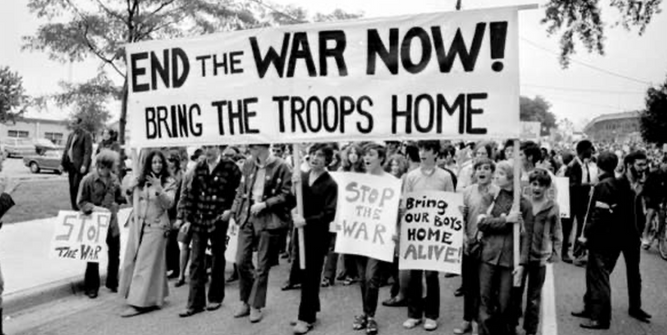








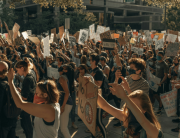







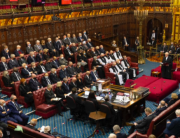

















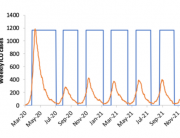

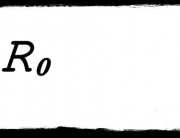

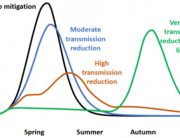







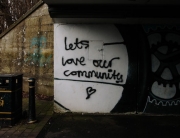
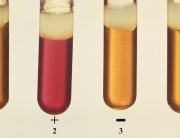


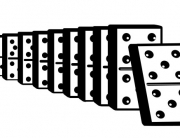







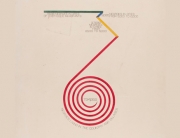


















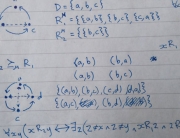







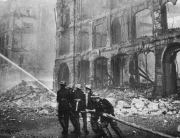









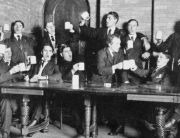










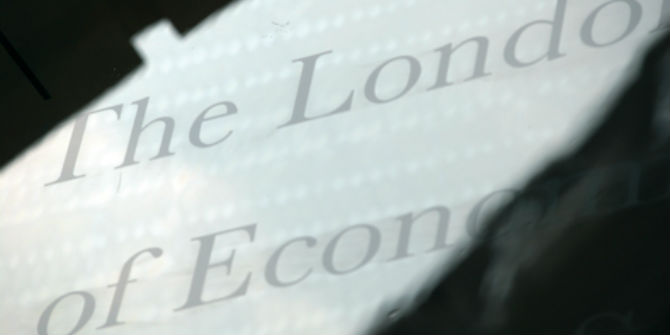
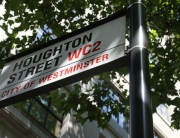






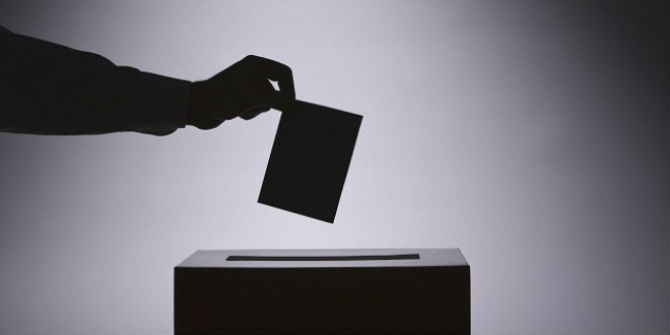



Connect with us
Facebook
Twitter
Youtube
Flickr